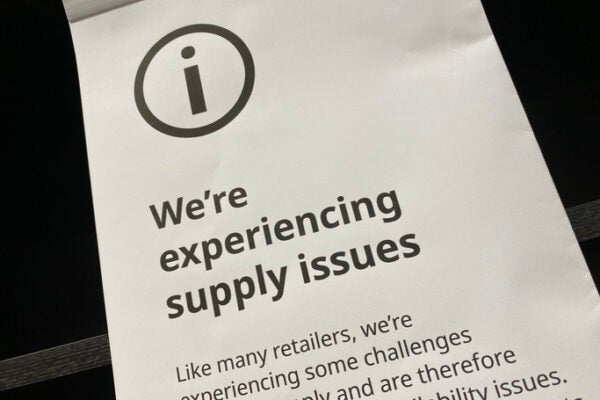The supply chain is broken, and it’s not getting better any time soon. You can’t find that new Ford F-150 truck or that Barbie doll for a holiday present. And if you do, it is going to cost you more than it would have last year. Companies — and even the government — can’t do much in the short term, certainly not before the holiday season. But they can do much to improve things next year and even more the next.
This year, we need to begin that process to fix the biggest problems currently facing the supply chain: the shortages of truck drivers, cargo containers and semiconductors.
And shoppers better pack their patience.
Supply chains include all the ships, planes, trains, trucks, ports and railheads needed for transport. One problem is that there are not enough truck drivers nationwide. Alongside the obvious problem of being unable to move enough products from points A to B in the U.S., there are knock-on effects. For example, ports are clogged because they’ve run out of space to unload cargo.
To clear the backlog, the government’s Supply Chain Disruptions Task Force said that ports would adopt 24/7 operations, but that round-the-clock mandate doesn’t apply to truck drivers because there are not enough of them to make 24/7 happen. They are the people who actually move the offloaded cargo away from the ports.
There is a disconnect.
To fix this, companies must improve truck driving as a profession. Pay has been declining in real terms for decades, and the job is stressful. So, companies such as Sysco, Coca-Cola, Wal-Mart, Penske and UPS need to make truck driving more attractive. Increasing pay is a good start. They can afford it. The cost to move cargo by truck has risen 50%-500%. However, it’s a medium-term fix because it takes months to train and certify a driver.
Another problem is containers. A popular Facebook meme says “American goods don’t get stuck on ships,” but even if consumers buy American to avoid long trans-Pacific shipping delays, many American-made goods such as Peterbilt trucks cannot be made without parts from overseas. Even when ports were briefly unclogged this summer, there still weren’t enough containers.
And when a company could find them, the price had increased by up to 800%. In other words, it now takes $2 more to ship a toy from Asia to the U.S. than it did before the pandemic.
High-profit products such as electronics and designer clothes can afford to pay more for the limited cargo space than can low-profit products like plastic toys or bulky ones like furniture. And the shortage of truck drivers is also just as much a problem for moving around U.S.-made goods as those from overseas.
Container manufacturers are increasing production in China, where 90% of containers are made. But this is not a short-term fix. Another possibility is for corporations such as Mattel to move manufacturing to someplace like Mexico, where labor is one-third less costly than in China. This has the added advantage of protecting companies from potential China-U.S. trade disputes, which have become more frequent in recent years.
Finally, semiconductors are used in making products as diverse as Ford trucks and Microsoft Xboxes. Those trucks and gaming systems are made in North America, so shipping isn’t the problem, but the worldwide shortage of chips is. There’s no short-run or even medium-run fix to producing more. Building chip factories takes years.
That said, companies such as Intel, Samsung and Taiwan Semiconductor Manufacturing Co. have all announced that they will build new factories in the U.S. The government can help here with tax reductions or eliminations, but it also needs to somehow compensate companies for the increased cost of addressing the hazardous waste created in manufacturing.
There is no quick fix. But companies can improve things in the longer term, particularly with government help. As for finding that special Barbie doll or Baby Yoda Animatronic, this may be the season for teaching delayed gratification when looking for the perfect holiday gift.
Edward Anderson is the Wright Centennial Professor for Management of Innovative Technology in the McCombs School of Business at The University of Texas at Austin.
A version of this op-ed appeared in Fortune.




